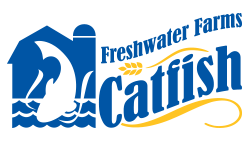About Us

Who We Are
Freshwater Farms began processing fish back in 1983 as a small family business.
Through the years, our company has evolved from its modest beginnings to one of the most trusted sources of Farm-Raised Catfish available. Because we take pride in what we do, we have developed and maintained partnerships with some of our customers for over 30 years. Our company has continued to operate under the same principles on which we were founded by earning our customers’ trust and committing to unmatched quality, service, and value. Our philosophy is simple; we always make every effort to deliver on what we promise.
Our History
With the tremendous growth of the Farm-Raised Catfish industry in the 1980’s, there came a need for more processing plants to process and market our product. Freshwater Farms was founded in 1983 as a small, family-owned operation, which became the benchmark of how we do business today. From its inception, Dean Kiker has managed the day-to-day operations and continues to serve as General Manager.
Harrel Potter began his farming operations in 1985 and purchased a stake in Freshwater Farms in 1986. He served as President for several years and continued to grow his farming operation to over 2200 acres. By 2006, it became apparent that farmers had to produce more fish per acre to survive imports and growing production costs. With the development of hybrid catfish and their potential to increase yields, Potter saw the opportunity to increase his production and upgraded his farm operation to 100% hybrids over the next few years.
In 2010, Potter became the sole owner of the company and, in 2015, he brought Kiker in as his partner and CEO. With Potter’s diversified catfish operation and Kiker’s processing experience, Freshwater Farms can guarantee our customers they are buying quality, sustainable, U.S. Farm-Raised catfish with every order. We know this because we hatch, feed, grow and process right here in Mississippi every day. It just doesn’t get any fresher than that.
Our Commitment to Quality
Freshwater Farms understands the value in quality and product consistency.
By investing in our employees, our facilities, and the products we produce every day.
By subjecting ourselves to HACCP audit controls throughout every aspect of processing.
By requiring trained, knowledgeable QA specialists to test and follow stringent quality guidelines.
By undergoing a rigorous, annual, voluntary product quality assessment through the Global Aquaculture Alliance to achieve BAP certification.
By striving for 100% customer satisfaction and confidence in the products we produce for every customer we serve.,
Quality System Management
Freshwater Farms offers a more stringent product quality assessment program through the Global Aquaculture Alliance (GAA). The Best Aquaculture Practice (BAP) program exceeds the current guidelines and standard operating procedures that are required in our industry through Quality System Management (Management Responsibility, Social Accountability, Environmental Management, Food Safety Management, and Traceability Management). BAP certification assures our customers that the products that come from our facility have been subjected to rigorous inspection and product quality analysis.

Our Facility
Freshwater Farms has a state-of-the-art, in-house, quality control laboratory at our plant facility. So, in addition to the tests the FDA and USDA are independently conducting on our products and facilities, we perform Environmental testing in our plant facility on a weekly basis for continuously monitoring TPC, Staph and Coliform/E. coli. This program exceeds the current guidelines and standard care that is required of our industry. This will assure our customers that the products distributed from our facility have been subjected to rigorous inspection, sanitation and product quality analysis.
What Makes Us Different
 Privately owned hatchery, farm, and processing facilities to ensure product safety, traceability, and sustainability.
Privately owned hatchery, farm, and processing facilities to ensure product safety, traceability, and sustainability.USDA Consumer Safety Inspectors are on site every day.
In-house HACCP-certified quality control personnel.
On-site laboratory for immediate environmental test results to ensure a clean, sanitary processing facility.
BAP-certified facility with enhanced Quality System Management that exceeds current state and federal guidelines.
Personalized customer service to provide a hands-on approach to meet specific needs and requests.
Hybrid Catfish
In the interest of increasing the efficiency of catfish production, channel catfish females have been crossed with blue catfish males to produce hybrid offspring. Research and field trials have shown that hybrid catfish performance is superior to channel catfish, with improved growth rates, resistance to diseases, tolerance to stressors, processing yields and ease of seining.
Studies have shown that hybrid catfish have a 30% higher production rate, a 19% higher survival rate, and a 15% lower feed conversion rate. The average marketable production cycle for a hybrid catfish is 266 days vs 403 days for channel catfish.
